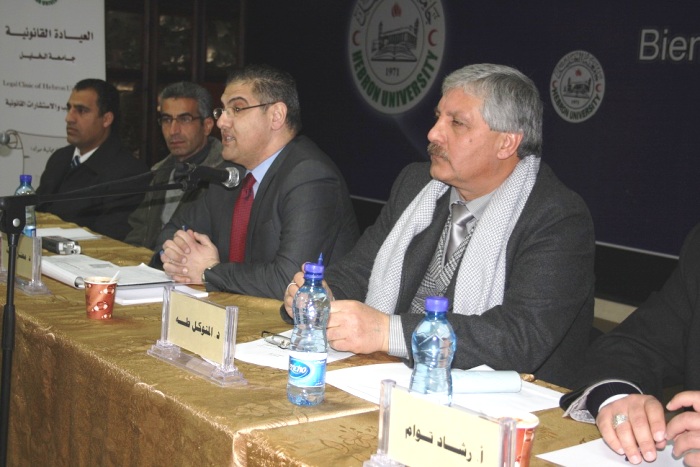News Archive
Hebron University Holds a Seminar on the Media Freedoms in Palestine

Hebron, 23 February 2012—The Legal Clinic of Hebron University, in cooperation with the Palestinian Ministry of Information and the Palestinian Center for Department and Media Freedoms (MADA), organized a seminar on the "Freedoms of Media in Palestine: Law and Practice". Over 200 people, representing various media, TV and radio stations as well as newspapers and human rights groups, law and media students attended the event. Six papers were presented at the seminar.
Dr. Mutaz Qafisheh, Professor of International Law and Director of Legal Clinic, provided an overview on the international standards of freedom of opinion and expression, mentioning that the and media freedoms comes within the number of freedoms including freedom of assembly, freedom of association, and freedom of religion. He focused on the common Article 19 of both the Universal Declaration of Human Rights and International Covenant on Civil and Political Rights which places a duty on governments to respect media freedoms and provide protection for journalists. He called upon Palestinian journalists to resort to relevant international institutions, including the United Nations Special Rapporteur on freedom of opinion and expression. He stressed the necessity of refraining from using the Israeli occupation as a pretext by the Palestinian authorities in both the West Bank and the Gaza Strip to crack down on journalists and media institutions; "because of the occupation, we, the Palestinians, should respect our human rights," he said.
Dr. Mutawakil Taha, Deputy Palestinian Minister of Information, discussed the role of his ministry in respecting journalist's rights in Palestine. According to Taha, in order to safeguarded media freedoms in the country, five requirements should be met: (1) completion of the legislation relating to media protection that promote freedom and privacy; (2) absolutely ban the imprisonment on the basis of opinion; (3) grantee the rights of all to obtain information without restrictions; (4) promote the independence of the Syndicate of Journalists; (5) and build strong relation between the official and private as well as civil society organizations working on media issues.
In his turn, Mr. Ghazi Bani-Odeh, representative of MADA, focused on the "Role of Civil Society Organizations in the Defense of Media Freedoms". He presented statistics related to the violations of freedoms of journalists in the Palestinian territories, referring to the fact that the Palestinian record on such freedom has been dropped from rank 82 in 2002 into 153 in 2012, according to Reporters without Borders. Abuses against Palestinian journalists by the Palestinians included arbitrary arrests, travel ban, closure of the media institutions, and confiscation of equipment, etc. Such violations are comparable with the Israeli crimes against journalists.
Mr. Rashad Twam, coordinator of the Legal Clinic, spoke about the "Legal Regulation of the Media Freedom in Palestine", based on a study that he previously prepared for MADA. He mentioned a number of laws on media, including the Palestinian Basic Law and the 1995 Law on Print and Publication. He recommended that the Palestinian Authority adopts a new law on the media that should be in line with international human rights standards. He called upon the Authority to abolish all legislation that violates the freedom of expression. Dr. Ahmed Switti, Head of Jurisprudence and Law Department, commented on the previous intervention. He highlighted the importance of modernizing Palestinian law based on technical expertise that should be provided by specialists in various fields, including the media.
The last intervention was presented by Dr. Saeed Shaheen, Professor of Media in Hebron University, on the "Impact of the Palestinian Political Divide on Media Freedoms". He said that it is a shame that the official bodies in both the West Bank and Gaza Strip attack each other on the official media channels, as if Palestine is liberated from the Israeli occupation. He called upon various Palestinian factions to unite as a grantee for the respect of media freedoms in Palestinian territories.
Many questions and interventions have been raised by media representatives and students and interesting discussion has followed.





